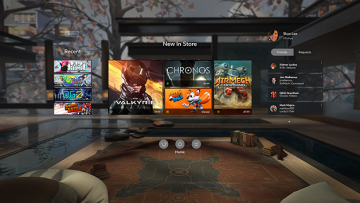
VR vs. Clapback
Here on what is collectively known as “The Internet” it’s all too easy to say exactly what you think of someone, especially when it comes to social media. Now, because any Tom, Dick, Harry, Mary, Mungo and/or Midge can spout off their thoughts on any matter without expecting much in the way of a response has continued to add to the image of social media being a mix of toxic services with toxic content – or as politicians are currently trying to convince us all, social media is THE END OF THE WORLD. Which considering there’s not a day that goes by at the moment without somewhere on the planet being either flooded or on fire is quite something.
So, as I say, thanks to the internet we have a greater access to individual people’s opinions than ever before.
But while we may not care for those opinions and can in turn respond it’s a little bit different when an official source of the affected entity unexpected responds to someone. While a company might have done so in a very stoic professional way in the past, social media has loosened the shackles of this and it has become increasingly popular to ‘call a spade a spade’ and respond with an appropriate level of derision or sass where appropriate.
To my knowledge there’s no official word yet to describe this phenomenon of a comeback from an official source, a company to both cut and let loose. So, let me suggest ‘corpback’ – a portmanteau of ‘corporate clapback’.
When I began last week’s VR vs. column I said about how I could’ve quite easily talked about the latest article explaining how virtual reality (VR) was dead or dying were it not for the fact that it’d already been touched on and that dammit, it was just too hot to start crunching data to prove things wrong. Fortunately, something marvellous happened after this – HTC Vive did an official response on their blog where they went into why it was inaccurate.
Unlike social media there was no ‘corpback’. No sass. It was just a case of HTC Vive sticking up for itself. That being said though, I can’t begin to tell you how damn satisfying was it that they did that. For too long people have been saying that. It’s become a story tech sites can wheel out every three months to fill a slot. It’s about time the headset stakeholders actually turned around and said “Hey…”.
You can read all about it here.
Now the outlet that started all of this, Digital Trends, has recently responded to Vive’s response as part of their coverage of it and essentially doubled down on what they’ve said. Though admitted that both sides could be right since their claim that headset numbers have dropped does not conflict with HTC Vive’s claim of market superiority.
“Our editorial made its claim based on Amazon sales rankings. That’s not the best way to chart sales because, like HTC’s own claims, it’s not based on objective data. We don’t know how many units are being sold.” Responded Digital Trends Matthew S. Smith. “We relied upon Amazon’s rankings because the companies making VR headsets have kept quiet. HTC, Oculus, or Sony could easily disprove sceptics if they shared outstanding sales figures — but they instead choose to play coy, providing relative measures like market share, revenue share, or lifetime total sales. It’s hard to believe that silence is due to success.”
Two points here. The first is that, well, Digital Trends aren’t exactly wrong to be honest. There is something of lack of transparency when it comes to sales figures of VR head-mounted displays (HMDs). We get the occasional nugget of info, such as when we heard how well the PlayStation VR was doing. But other than that, there isn’t much in the way of official sales figures that have been bandied about.
The second is the somewhat social media-y stance of ‘we’ll say this until you disprove it’. Because it doesn’t excuse that, with or without those figures, it using the Amazon chart positioning to prove their initial point was, at best, utter bobbins. In the end it may not be about both sides being right, because they might easily both be wrong. Will we ever find out? Does it even matter? At the very least it was nice to see someone sticking up for themselves when it comes to VR and triggering this discussion.
So, in that case…Oi! Vive! Stop trying to write VR vs. articles. That’s my bit. You tryin’ to take my spot, man? Me and you are gonna have words outside. You’d best watch where you’re stepping, capeesh? Or you’ll be wearing a concrete headset if ya get my drift!
Now excuse me. There’s an orange here I need to eat.
This article was originally written by the author for VRFocus.





![Private: [ID: _ysslzefllQ] Youtube Automatic](https://lastminutecontinue.com/wp-content/uploads/2024/10/private-id-ysslzefllq-youtube-au-360x203.jpg)


